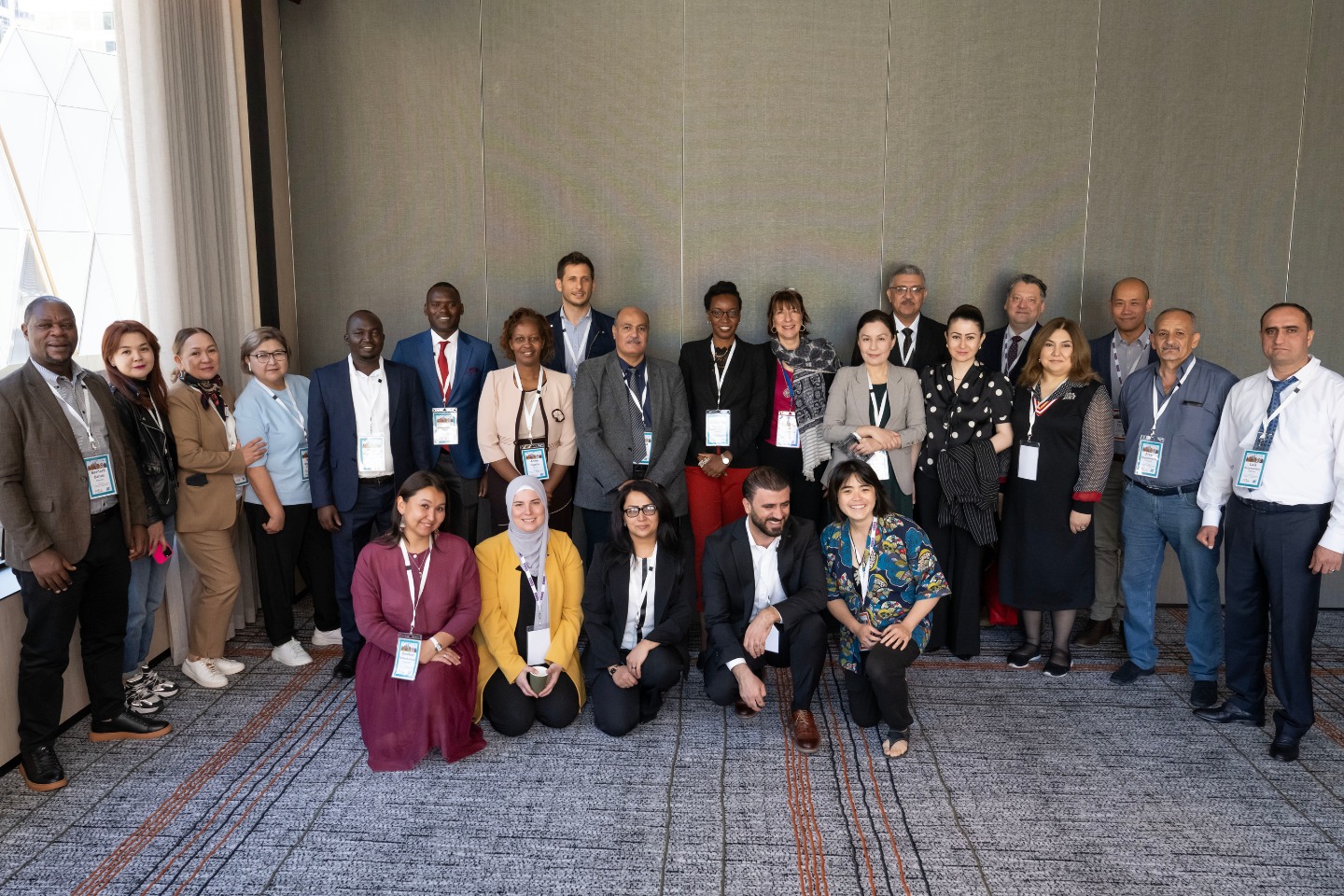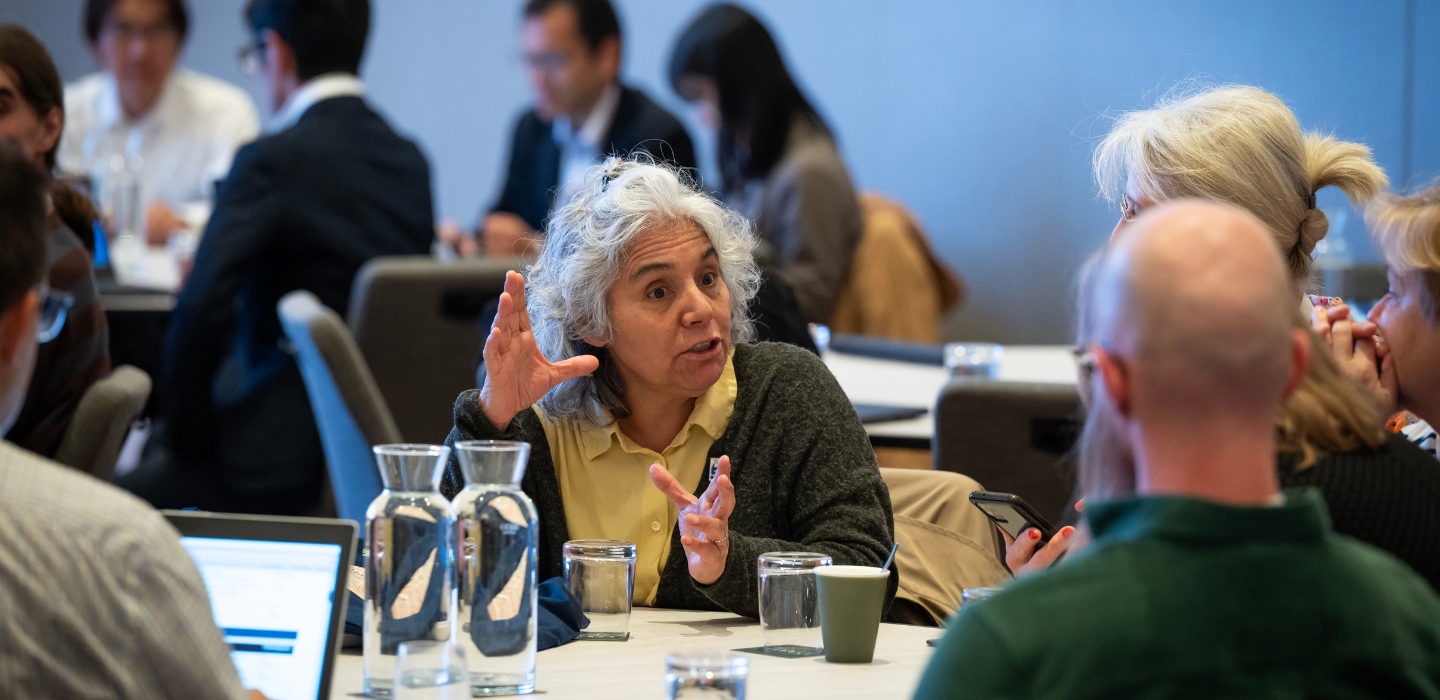
Motivated by improving education, the world comes together
19 Nov 2024 9 minute readMore than 90 countries have come together in full agreement on their purpose and an effective way to begin positive change for young people and the future.
About 200 representatives met in Melbourne this month to prepare for the 2025 Programme for International Student Assessment (PISA) Main Survey. For some, the camaraderie that comes with being a PISA National Program Manager (NPM) has been growing for more than 20 years.
‘I believe in PISA,’ says Ema Lagos, Chile’s NPM since 2009. ‘Sometimes when I speak about it, people think I’m preaching because I’m so passionate about what PISA is or means.
‘I’m so convinced this information is important for countries because it’s about people and families into the future. The predictive power that PISA testing has is very important.’
PISA tests how 15-year-old students can apply knowledge in reading, science, maths and different 21st century skills, every 3 years. It has generated evidence to help improve education policies and outcomes since 2000.
An initiative of the OECD, the Australian Council for Educational Research (ACER) helped develop the first 5 cycles and has seen it grow in scale from 255,000 students across 32 countries to more than 650,000 students across more than 90 countries and economies.
ACER is now hosting NPMs in its role leading PISA 2025 in partnership with Open Assessment Technologies, cApStAn, HallStat and Westat.
It is the collective commitment of NPMs and officers to building the global PISA community that drives its success, PISA 2025 survey director and ACER Research Director Dr Goran Lazendic says.
‘By working together, we're able to take on the challenges of moving PISA to a new generation of large-scale online assessments,’ he says.
‘I’m very grateful to my international colleagues; every time we come together, I learn a lot. Their insights and experiences are essential in supporting successful delivery of PISA 2025.’
Tue Halgreen, a senior policy analyst with the OECD, explains the connection between those working to improve education as a pillar of their country’s future prosperity.
‘It’s by working together that we can really identify what works, get inspiration and motivation to go back home and say, “I actually know someone who’s doing this’’,’ he says.
‘Most countries have an idea of how they’re doing and a feeling about how their investments are paying off, but it’s really difficult to benchmark against other countries.
‘(After getting the data from PISA) the next step is to ask what other countries are doing. Perhaps they are investing the same but getting better results. So you ask what are they doing that I can learn from?
‘Is it the way the system is structured or the way they attract teachers and retain them? Is it the autonomy of their system or the oversight that they have in schools?
‘Is it in the curriculum, or is it factors outside of school? PISA makes you ask these questions,’ Mr Halgreen says. ‘It also gives you answers to many questions.’
Why Rwanda has joined PISA for 2025
Ten new countries – from Latin America, Africa and Central Asia – will conduct PISA for the first time next year. One of those is Rwanda, which its NPM Dr Bernard Bahati says is on a significant journey.
‘Thirty years ago, Rwanda was devastated by the genocide against the Tutsi,’ he says.
‘One of the lessons learnt from this tragic episode is the Rwandans are resilient, and since then the country has worked tirelessly to recover and rebuild, focusing on all sectors of life including education.’
A significant change after 1994 was greater access to education that was previously only available to ‘a privileged few’. It has motivated continuous efforts to improve and stabilize the education system, Dr Bahati says.
While Rwanda’s own assessments provide valuable information on progress toward quality education, being able to measure student performance by international standards is also a priority.
‘Therefore, Rwanda decided to participate in PISA 2025, a rigorous international assessment that has led to positive educational reforms in other countries’, Dr Bahati says.
‘We expect to leverage PISA results to assess our education system, and this will eventually lead us to take a step back to making strategic adjustments and engage different stakeholders to ensure we achieve the quality of education we want.’
How Uzbekistan is using data from 2022
NPM Dr Abduvali Ismailov says his country’s strategy for developing the public education system supports ‘well-rounded learning outcomes to foster a strong foundation for Uzbekistan’s future’.
Uzbekistan’s first cycle of PISA in 2022 has resulted in comparable data on students' achievements in essential skills for real-world problem-solving, he says. It has also been influencing policy.
‘PISA data was deeply analysed; identified advantages and disadvantages of education were reviewed (and) teacher training and principal training programs and schools’ curriculum were updated.’
Dr Ismailov expects participation in PISA 2025 to provide insights into the progress of Uzbekistan’s educational reforms.
Seeing change in Chile for disadvantaged students
For Ema Lagos, seeing improvement over time for Chile’s most disadvantaged students is a driving force in her continued involvement in PISA.

‘I come from a very unequal country,’ she says. ‘For me it’s very sad to see that every measure we make, the situation doesn’t change too much – for example with the huge gender gap we observe.
‘But some policies do support the poor powerfully, and PISA has shown that this huge difference is still there but that 20% of the poorest people have improved in PISA scores, and that's very encouraging.
‘We also have 13% of resilient students, which is higher than 10% in the OECD average, so it means that these policies focused on more vulnerable groups are working for our people,’ Mrs Lagos says.
Rigorous process and support driven by purpose
At different tables and through different presentations at the meeting, NPMs are finding their feedback to ACER on in-country trials is helping shape PISA 2025.
Some new countries, like Rwanda, are also expecting that they will benefit from being involved in the ‘administration’ of the process.
cApStAn senior project manager of large-scale cross-cultural surveys Elica Krajceva says the company has trained teams to use translation tools and offered technical support.
It revises translations provided by countries in more than 50 languages so that a test question like ‘how many sides does a hexagon have’ does not appear as ‘how many sides does a 6-sided figure have’, she says.
‘The PISA ecosystem is unique in that a mix of professional and non-professional users need to work in the same technology-rich environment.
‘Being confronted with similar challenges brings them closer together with the common goal of producing national versions of test questions that are highly comparable across languages, regions and cultures,’ Mrs Krajceva says.
‘cApStAn is proud to contribute to a scientific endeavour that has such a direct bearing on society at large and humbled to see how countries pool resources and seek consensus to make it possible to understand the factors that drive achievement and equity in education.’
With the collective efforts of the OECD, ACER and its consortium partners, and the participating countries and economies, PISA 2025 will gather evidence to help improve education policies and outcomes around the world.
Learn more about the OECD Programme for International Student Assessment
